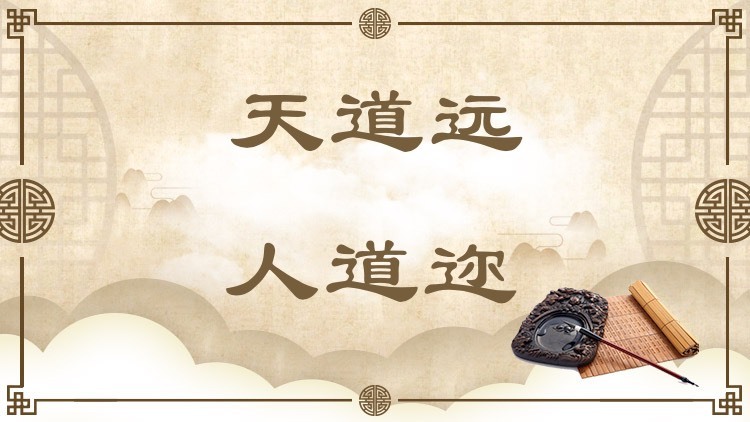The Way of Heaven Is Far Away, While the Way of Man Is Near at Hand

天之道遥远而人事之道切近。出自《左传》,为春秋时郑国大夫子产(?—前522)所言。子产所言“天道”主要指星辰运行等天象所遵循的法则,“人道”则指人事运行的规则。子产提出“天道远,人道迩”之说,以天道、人道的远近之别,来强调星象的变化与人事无关,反对用星象的变化来附会甚至干预人事。
This saying is recorded in Zuo's Commentary on The Spring and Autumn Annals and is attributed to Zichan (?-522 BC), a senior minister of the State of Zheng during the Spring and Autumn Period. Here, the way of heaven refers to the law of the heavenly phenomena, including the movement of celestial bodies, while the way of man denotes the norms of human affairs. By drawing a sharp distinction between the remoteness of the way of heaven and the closeness of the way of man, Zichan sought to make clear that human affairs have nothing to do with astral movements and to reject any correspondences or causal connection between heavenly phenomena and human affairs.
引例 Citations:
◎夏五月,火始昏见(xiàn)。丙子,风。梓慎曰:“是谓融风,火之始也。七日,其火作乎!”戊寅,风甚。壬午,大甚。宋、卫、陈、郑皆火。梓慎登大庭氏之库以望之,曰:“宋、卫、陈、郑也。”数日,皆来告火。裨(pí)灶曰:“不用吾言,郑又将火。”郑人请用之,子产不可。子大(tài)叔曰:“宝,以保民也。若有火,国几亡。可以救亡,子何爱焉?”子产曰:“天道远,人道迩,非所及也,何以知之?灶焉知天道?是亦多言矣,岂不或信?”遂不与,亦不复火。(《左传·昭公十八年》)
夏五月,大火星(心宿二)在黄昏出现。丙子日,刮风。梓慎说:“这叫做融风,是火灾的起始。七天之后,恐怕就要出现火灾了吧?”戊寅日,风大了。壬午日,风更大了。宋国、卫国、陈国、郑国都出现了火灾。梓慎登上大庭氏的府库眺望,说:“这是宋国、卫国、陈国、郑国。”过了几天,四国都来鲁国告知火灾。裨灶说:“不听信我的话,郑国还会有火灾。”郑国人请求采纳裨灶的话,子产不同意。子太叔说:“宝器是用来保护百姓的。如果发生了火灾,郑国几近灭亡。可以用宝物挽救灭亡,您何必吝惜呢?”子产说:“天之道遥远而人事之道切近,两者没有关系,如何能由天道知道人事呢?裨灶哪里知晓天道呢?只是他说得多了,难道不会偶尔说中吗?”于是没有给祭神的宝物,郑国也没有再发生火灾。
In summer, in the fifth lunar month, the Fire Star (aka. Antares, the brightest star in the constellation Scorpius) became visible at dusk. On the bingzi day of the month, wind started to blow. Zi Shen said, "This is the northeast wind, a sign of fires in the near future. I am afraid fires will break out in seven days." Two days later (on the wuyin day) of the month, the wind blew much harder. Four days later (on the renwu day), when there was a gale blowing, fires raged in the states of Song, Wei, Chen, and Zheng. Zi Shen ascended the warehouse built at the site of the House of Dating, observed the situation, and claimed, "There are fires in Song, Wei, Chen, and Zheng." Several days afterward, envoys of all four states came to the State of Lu to report the blazes. Pi Zao said, "If you do not take my advice, a fire will break out again in Zheng." The people of Zheng heeded his warnings and requested that his advice be followed, but Zichan refused. Zitaishu asked, "Treasures are for protecting civilians. Once a fire breaks out, the state will be on the verge of collapse. Now we can trade the treasures for security. Why do you begrudge giving them up?" Zichan replied, "The way of heaven is far away, while the way of man is near at hand. How can we know the things that are beyond our reach? How can Pi Zao know the way of heaven? As long as one makes plenty of predictions, there will always be a few that will prove to be true." Consequently, Zheng did not offer sacrifices to the gods, and fires did not occur. (Zuo's Commentary on The Spring and Autumn Annals)
推荐:教育部 国家语委
供稿:北京外国语大学 外语教学与研究出版社
责任编辑:钱耐安





